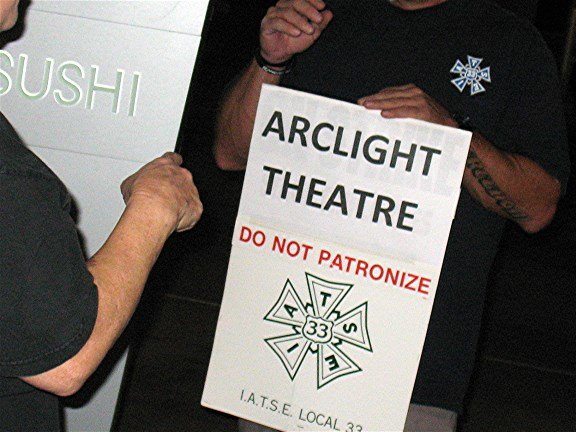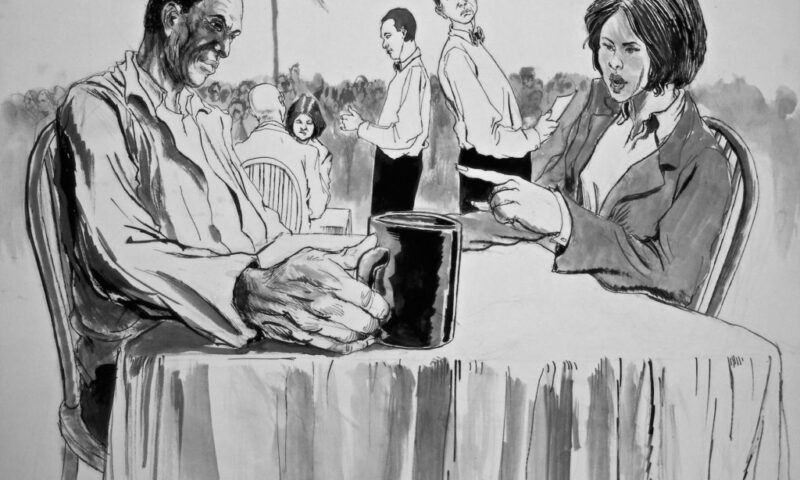


Wage theft is a serious yet seldom-reported crime that victimizes millions of Americans – particularly low-income and immigrant workers. Today, as part of an ongoing examination of workplace issues, Capital & Main debuts a new series focusing on wage theft, beginning with a primer on the problem by Bobbi Murray, followed by Joe Rihn’s profile of a port truck driver who works in an industry where wage theft is a daily fact of life.[divider]
The expression “wage theft” is a deceptively gentle term. Perhaps “paycheck mugging” more accurately describes the violence done to the earnings of millions of Americans each year.
If you are a target of wage theft no one pistol-whips you to acquire your valuables–but you definitely get robbed. Every week Los Angeles workers get held up for $26.2 million through unpaid overtime, being pressured to work through unpaid breaks or off the clock;
» Read more about: Wage Theft Confidential: How Your Earnings Are Stolen »


For Victor Vitela life revolves around work. A reserved man with dark hair and a powerful frame, Victor makes his living driving an 18-wheeler loaded with cargo back and forth from the ports of Long Beach and Los Angeles to the Inland Empire. His tone is matter of fact when he talks about his job with QTS Inc., a Gardena-based hauling firm. Victor often works late, until three or four in the morning, leaving just enough time to catch a few hours of sleep before the day begins again at 7 a.m. In his line of work, 20-hour days are the norm. That doesn’t leave enough time to return to his family in Ventura County, so he spends Monday through Friday living out of his truck.
Victor may spend a huge amount of time working for QTS, but you wouldn’t know it from his paycheck, which is eaten up by the kind of expenses and deductions many employers would be expected to pay – the insurance on his truck,
» Read more about: Wage Theft Confidential: A Truck Driver’s Story »


“Hello again,” a familiar female said to Little Joe, who stood ready for flight or fight on the sidewalk. The woman who spoke leaned out of the Escalade’s open rear door. The pearl black vehicle had stopped near him on the street.
He frowned, recognition blossoming. She’d been the one with Teaflake at the burrito joint. He came closer so as to get a better look inside the SUV. “Hello yourself.” There was only her and a bald-headed driver. Well at least it wasn’t Teaflake, he reflected—though it could be one of his enforcers. He remained wary.
“Can I give you a lift?”
“Is this a rubout?” he said, only half-joking.
She laughed heartily. “You’ve been watching too many of those Jimmy Cagney movies.”
The woman was charming and his curiosity was getting the better of his apprehension. What the hell, he concluded. Dressed in slacks and a ribbed top,
» Read more about: The Dixon Family Chronicles: “Esoterica” »


To say that Ed Wytkind likes to talk about America’s epic failure to invest in transportation is akin to saying that Pauline Kael enjoyed critiquing films or that Christopher Hitchens was fond of writing political commentary. Because Wytkind, who heads the AFL-CIO’s Transportation Trades Department and will be honored next month at the L.A. Alliance for a New Economy’s City of Justice Awards, lives and breathes transportation, and is determined to bring the issue front and center in the national conversation.
Wytkind, one of the country’s leading advocates for long-term investment in such things as mass transit and air travel modernization, offers a powerful case that the future of America’s economy is inextricably linked with our decision to either fund or starve our transit systems. And he can be a fierce critic of Congressional inaction on such priorities as full of funding Amtrak and repair of the nation’s neglected highways and bridges.
» Read more about: Trains, Planes and Politics – A Talk With Transportation Advocate Ed Wytkind »



“Shame on Arclight!”
“What do we want? Living wages! When do we want them? Now!”
Last Saturday evening the movie-and-sushi crowd that regularly assembles in the Sunset Boulevard ArcLight Cinema’s courtyard witnessed a spirited protest organized by the International Alliance of Theatrical Stage Employees Union (IATSE) Local 33, on behalf of the projectionists employed by Tinseltown’s priciest movie venue. It was the latest in a series of union actions against ArcLight aimed at drawing public attention to the theater projectionists’ meager wages — under $13 an hour and without health care or pension benefits — nearly half of IATSE’s pay and benefits compensation.
The timing couldn’t have been more annoyingly inopportune for ArcLight. The evening marked the grand opening of the Lionsgate picture Interstellar and, as it turns out, Lionsgate is now busy outsourcing, to overseas, jobs previously held by union musicians.



The Long Beach City Council is set to begin talks on Monday about a Project Labor Agreement that would apply to all city construction projects with a price tag of $125,000 or more. Project Labor Agreements, or PLAs, are “pre-hire” arrangements between unions, government agencies and private contractors who work together on construction projects. PLAs set wages, decide hiring practices and other matters between management and labor, often with the goal of creating community benefits through good jobs. According to a 2001 study on PLAs, prepared for the California State Senate, Project Labor Agreements have existed in California since construction began on the Shasta Dam in 1938, and have been used in both public and private sector projects.
“Project labor agreements are arguably the most important change in labor-management relations in the construction industry in recent years,” the report said.
Typically PLAs ensure that large construction projects pay fair wages,
» Read more about: Long Beach Considers Citywide Project Labor Agreements »



Like most political junkies, I have been so focused on the recent election – national, statewide and local – that I have not been thinking much further. But the vicissitudes of politics always bring me back to the core issues. Once the up and down results are in, I remember again that the electoral process amounts to only a part of what makes a democracy work.
Yes, we must have listening and sympathetic ears among those elected to office. Yes, it helps to have people from the margins brought into the arenas of decision making and sitting in the rooms where deals get made. But without advocates for the issues that matter, however much money gets spent and whoever is elected remains irrelevant.
My loneliest moment as an elected official came about three months into my first term as a member of the Santa Monica City Council. We were deciding on development projects one at a time because we had scrapped the laissez faire rules,
» Read more about: The Heart of the Matter: What Counts After Election Day »
Los Angeles/Long Beach Ports truck drivers Mateo Mares and Amicar Cardona have returned to the jobs they had been fired from– not as misclassified “independent contractors,” but as regular company employees covered by federal labor laws. The men were dismissed by Green Fleet Systems (GFS) last January for disputing their contractor status, for filing state claims for stolen wages and for their open support of the Teamsters union.
In October, after a federal district court had ruled in Mares and Cardona’s favor and ordered the two drivers reinstated, GFS sought an emergency injunction from the U.S. Court of Appeals, Ninth Circuit. The appeals court denied GFS’s request, setting the stage for Mares and Cardona’s triumphant return to work today.
“America’s port drivers are the poster child for wage theft in America,” said Jim Hoffa, Teamsters General President. “Like millions of workers, drivers are treated like regular employees but illegally compensated as independent contractors.
» Read more about: Two Fired Port Truck Drivers Return to Work in Landmark Case »


And wisdom is a butterfly
And not a gloomy bird of prey.
— W.B. Yeats
 Artist Eric Drooker’s drawing of an iron worker sitting astride a steel girder looking solemnly at a butterfly is a cool image. (The drawing appeared as a 2009 New Yorker cover.) Judging from the shadows on the buildings, the sun is low in the sky. There is no sweat dripping from a grimy brow. Unlike the socialist-realist paintings of noble workers striding forward or the purposeful energy depicted in WPA murals of the 1930s, the iron worker here is alone and contemplative – sad, even.
Artist Eric Drooker’s drawing of an iron worker sitting astride a steel girder looking solemnly at a butterfly is a cool image. (The drawing appeared as a 2009 New Yorker cover.) Judging from the shadows on the buildings, the sun is low in the sky. There is no sweat dripping from a grimy brow. Unlike the socialist-realist paintings of noble workers striding forward or the purposeful energy depicted in WPA murals of the 1930s, the iron worker here is alone and contemplative – sad, even.
Where are his fellow workers who might provide a release from strenuous labor with a moment of conviviality? The city itself appears quiet. The strutting, tempestuous, scandalous streets of New York do not even attract a glance. This iron worker reminds me of one of Edward Hopper’s lonely figures,



This week California – the state that passed the Three Strikes Law in 1994 – voted 59 to 41 percent in favor of Proposition 47. Proposition 47 will reclassify six non-violent felonies as misdemeanors and redirect the savings in prison spending toward substance abuse treatment, mental health counseling and education.
Is this a movement moment for the long-running campaign to end mass incarceration? There does seem to be a lot of positive activity on the issue. And not just in California.
“Fair Chance Hiring Policies”—also known as “Ban the Box” policies—now cover 70 cities and counties, and 12 states, according to the National Employment Law Project. These policies delay consideration of a person’s conviction history until later in the hiring process, making it easier for those who have felonies on their record to find employment. Big retailers, such as Target, have also banned the box.
» Read more about: What’s Missing from the Movement to End Mass Incarceration? »



Have you ever felt paralyzed by the apocalyptic projections of global warming? Have you walked away from a presentation, article or news report feeling despair about the heating of our planet? You’re not alone. Amongst young Americans polled, global warming is a major worry.
The fear is good and warranted; the despair and paralysis are not. According to Jonathan Parfrey of the L.A.-based nonprofit, Climate Resolve, climate change needs to be seen as a local issue that people can address and do something about. And he has many ideas about how that can be done.
“L.A. has a spectacular climate,” says Parfrey, “we all love it. That’s why we’re here.” But global warming can hurt our city by impacting the things we care most about — including our health, food and water supply, property values, air quality and fire safety.
What’s called the “urban heat island effect” —



On Tuesday San Francisco voters approved by a 77 to 23 percent margin Proposition J, which will increase the city’s minimum wage from the current $10.74 per hour to $12.25 per hour by May 1, 2015. The city’s minimum wage would climb to $13 per hour by July 2016; to $14 per hour by July 2017 and $15 per hour by July 2018.
“Prop. J will provide a much needed raise to $15 per hour for 140,000 of the lowest paid workers in our city,” Gordon Mar, executive director of Jobs with Justice, San Francisco, told Capital & Main. “Prop. J will also raise the bar nationally for minimum wage policies.”
The “Fight for $15” to gain a higher minimum wage for workers began in Seattle, Washington. Voters there, with Socialist Alternative city council member Kshama Sawant spearheading a grassroots movement,
» Read more about: Big Bay Area Victories for Living Wages »


“A lot of people want to make changes but they don’t know where to go,” said Tiesha Speights on the afternoon of Election Day. So Tiesha went to the people, knocking on doors in Long Beach on behalf of Proposition 47, the California ballot initiative written to reduce the penalties for low-level crimes that involve less than $950, from felony levels to misdemeanors. Speights had been hustling block-by-block for the “Yes on 47” campaign for three weeks. Her work and the canvassing efforts of countless others paid off – Prop. 47 would pass handily Tuesday by a 58.5 percent to 41.5 percent margin.
Speights deeply connected with the measure, which permits re-sentencing for those currently serving a prison term for any of the offenses that the initiative reduces to misdemeanors, including forgery, theft, minor drug offenses and shoplifting. Some 10,000 inmates would be eligible to have their sentences reconsidered.
» Read more about: Proposition 47: Winning One Door at a Time »


Juanita Evers and Hank Dixon walked into the Mercado La Paloma on Grand at a little past one in the afternoon. The main building had been a garment factory but was now turned into an open space of mom and pop shops. There was one featuring Oaxacan handmade curios, a sports gear seller and various ethnic-style eateries. The place had been developed by a nonprofit.
“How about over there?” Juanita said, pointing to a stall offering Thai food tucked back in a corner of the expanse.
“Okay by me,” Dixon replied. “I could stand some spicy chow.”
They ordered and sat at a nearby table. He said, “You really think the congresswoman can help us?”
“She’s very interested in what the university does and wants it to do right by her constituents.” Juanita was a field deputy for Congresswoman Karen Nelson, whose district included the Eden Arms where Dixon lived.
» Read more about: The Dixon Family Chronicles: “You Gonna Step Up?” »



There they go again.
Last Saturday, three days before the election, the Los Angeles Times ran a somewhat bewildering piece about Proposition 47, the California state ballot initiative that seeks to de-felonize certain nonviolent crimes that are currently counted toward a convict’s three-strike tally.
“Prop. 47 puts state at center of a national push for sentencing reform,” ran the feature’s headline on the Times’ website. (“Ground Zero for Penal Reform,” was the print version’s more succinct headline.) And, sure enough, for the first 300 words the piece is pretty much a description of Prop. 47, while noting its major funders are philanthropist George Soros and several liberal foundations. Then, however, in the seventh paragraph (a jump page in the print edition), we get what the Times really wants to say:
The coordination by a few wealthy foundations to change public policy represents a legitimate but worrying form of political influence,
» Read more about: L.A. Times’ “Even-Handed” Approach to Prop. 47 »



Halloween is the time of year dedicated to scary stories, and in In the Public Interest report, “Out of Control,” there are 26 frightening and factual tales of how the push for government outsourcing is hurting taxpayers around the country.
You will be horrified by the real-life examples of Americans tricked by privatization, from a nun fighting cancer who was wrongly dumped from food stamps and Medicaid to foster children placed in severely abusive homes. Privatization is something to be feared when our elected officials aren’t carefully protecting the public’s interest.
We work every day to prevent future privatization horror stories from creeping and crawling their way into our democracy. Because just like Chicago, which leased its parking meters for 75 years to a Morgan Stanley-led private consortium, a bad privatization deal can haunt a community for generations.
Show off your Halloween spirit and share this terrifying report on twitter using the hashtag #PrivatizationHorror.
» Read more about: Privatization’s Trick-or-Trick Halloween »


 The chefs over at Labor 411 have come up with a host of Halloween recipes from union-made ingredients. Treats include Mummy Dogs, No-Bake Marshmallow Witches, Rummy Worms, and our favorite, Graveyard Rice Krispies Treats. We’ve included the easy-to-follow recipe below.
The chefs over at Labor 411 have come up with a host of Halloween recipes from union-made ingredients. Treats include Mummy Dogs, No-Bake Marshmallow Witches, Rummy Worms, and our favorite, Graveyard Rice Krispies Treats. We’ve included the easy-to-follow recipe below.
And if you still haven’t purchased treats for tonight’s trick-or-treaters, check out Labor 411’s list of union-made candy!
Graveyard Rice Krispies Treats
Ingredients (purchase from your local unionized grocery store):
4 cups Kraft miniature marshmallows
¼ cup Land O Lakes butter, cubed
6 cups Kellogg’s Rice Krispies cereal
12 Oreos
1 tube white decorating gel frosting
1 can Betty Crocker chocolate frosting
Halloween sprinkles
Instructions:
1. In a large saucepan, combine and stir marshmallows and butter over medium-low heat until melted.



Today Christopher Klein, a U.S. bankruptcy judge, approved the city of Stockton’s plans to exit bankruptcy – ensuring that the pensions of Stockton’s retired public workers will not be subject to a tug of war among the city’s creditors.
“Judge Klein’s decision reinforces the confidence we had in our plan from the beginning,” Stockton City Councilmember Elbert Holman told Capital & Main by phone. Holman, along with Paul Canepa and Kathy Miller, voted to file for Chapter 9 bankruptcy; all three remain in office.
The judge’s Thursday decision had not been a foregone conclusion. On October 1, Klein had ruled that the federal bankruptcy code could trump the state’s retirement law that protects public employees’ defined-benefit pensions – and thus expose these retirement plans for “impairment,” or cuts. This prompted the Sacramento Bee’s political columnist, Dan Walters, to cite a Wall Street source’s favorable response: “Moody’s Investors Service underscored that effect by declaring that Klein’s ruling is ‘welcome news for investors’ in municipal debt.”
Stockton’s experience with bankruptcy – and the shadowy role of Wall Street credit-rating firms —
» Read more about: Judge Keeps Pensions Out of Stockton Bankruptcy Deals »



A 40-foot fall isn’t necessarily fatal for the average adult. But for California’s public employees whose jobs require them to routinely work on ladders or mechanical devices at heights more than 40 feet, it was deemed enough of a threat to life and limb to offer them a modest premium in their monthly pay packet.
In the case of firefighters, it also seemed sensible to kick in a little more for the tiller operators that control the 100-foot aerial ladders from which their brothers occasionally rescue a taxpayer from a burning building.
In fact, 99 such hazard premiums and professionalizing workforce incentives that have historically been considered pensionable compensation for public workers were deemed to be such no-brainers that they passed the scrutiny of the legislature and the governor when Jerry Brown signed into law 2012’s Public Employee Pension Reform Act (PEPRA). Today the average public pension in California is $2,945 per month.
» Read more about: Pension Envy: What the L.A. Times’ CalPERS Story Got Wrong »


María Elena Durazo announced today that she will leave the LA County Federation of Labor, which she has led for more than eight years.
“I feel that the Los Angeles labor movement is very strong, very progressive, very proactive,” she told the Los Angeles Times. “Altogether, we have accomplished a lot. And there is a passion I have always had for immigration and civil rights. So I have the opportunity to do this and completely focus on those issues.”
Durazo will take a new post as international vice-president for immigration, civil rights and diversity at UNITE HERE, whose Los Angeles-based Local 11 she led before joining the County Fed.

A Los Angeles magazine profile last year called Durazo “the leader of what is perhaps the most robust labor movement in the country.” With her lead,